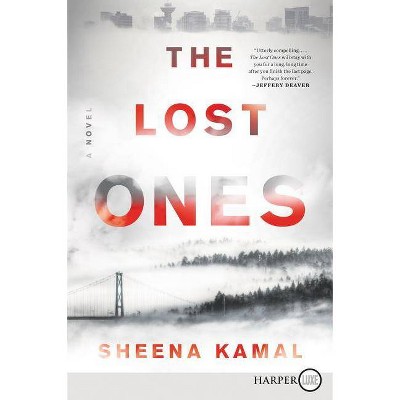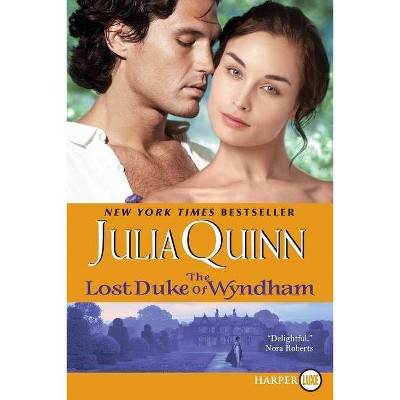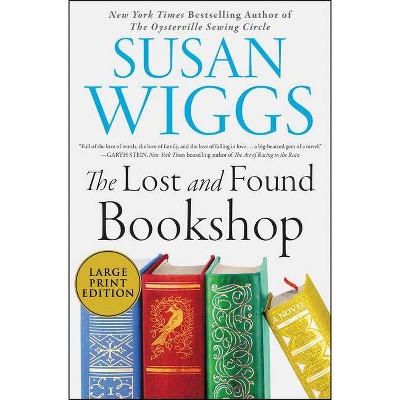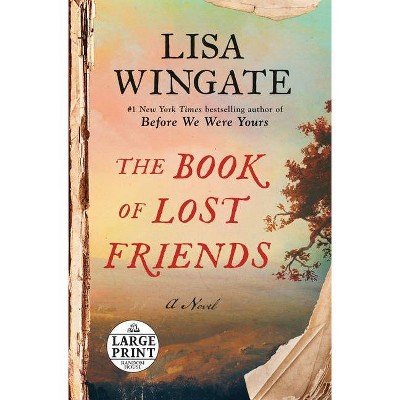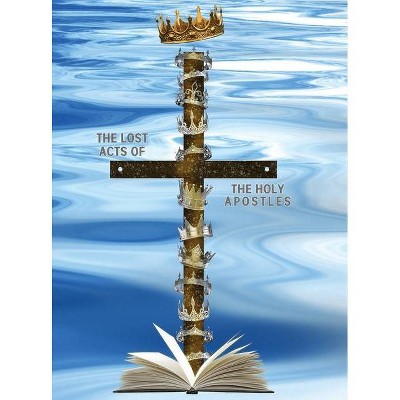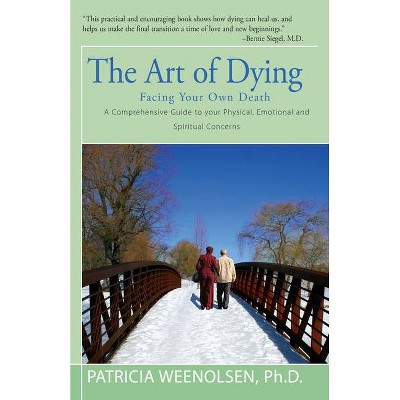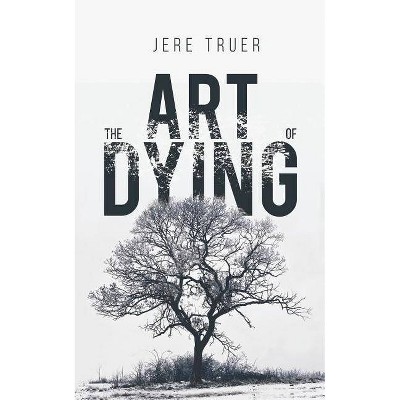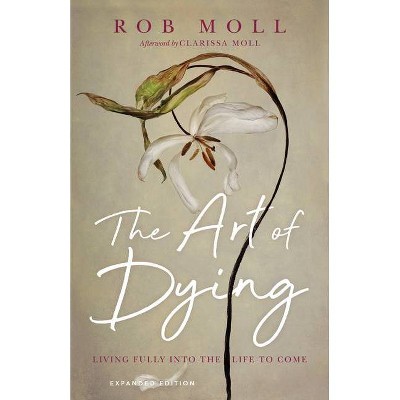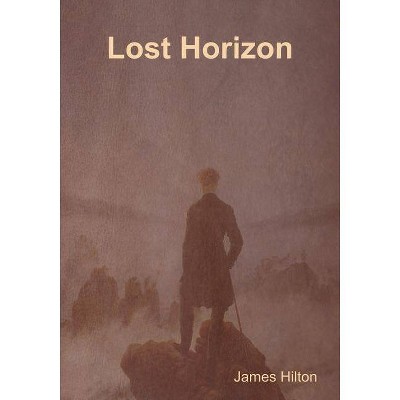The Lost Art of Dying - Large Print by L S Dugdale (Paperback)
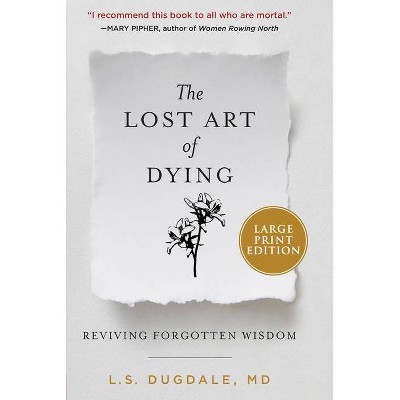
Similar Products
Products of same category from the store
AllProduct info
<p/><br></br><p><b> About the Book </b></p></br></br>"A Yale physician's fascinating and wise exploration of why so many people die poorly and how a medieval bestseller on the art of dying well holds important lessons for today"--<p/><br></br><p><b> Book Synopsis </b></p></br></br><p><strong>A Columbia University physician comes across a popular medieval text on dying well written after the horror of the Black Plague and discovers ancient wisdom for rethinking death and gaining insight today on how we can learn the lost art of dying well in this wise, clear-eyed book that is as compelling and soulful as </strong><em><strong>Being Mortal, When Breath Becomes Air</strong></em><strong>, and </strong><em><strong>Smoke Gets in Your Eyes.</strong></em><br/> <br/> As a specialist in both medical ethics and the treatment of older patients, Dr. L. S. Dugdale knows a great deal about the end of life. Far too many of us die poorly, she argues. Our culture has overly medicalized death: dying is often institutional and sterile, prolonged by unnecessary resuscitations and other intrusive interventions. We are not going gently into that good night--our reliance on modern medicine can actually prolong suffering and strip us of our dignity. Yet our lives do not have to end this way.</p><p>Centuries ago, in the wake of the Black Plague, a text was published offering advice to help the living prepare for a good death. Written during the late Middle Ages, <em>ars moriendi</em>--<em>The Art of Dying</em>--made clear that to die well, one first had to live well and described what practices best help us prepare. When Dugdale discovered this Medieval book, it was a revelation. Inspired by its holistic approach to the final stage we must all one day face, she draws from this forgotten work, combining its wisdom with the knowledge she has gleaned from her long medical career. <em>The Lost Art of Dying</em> is a twenty-first century <em>ars moriendi, </em>filled with much-needed insight and thoughtful guidance that will change our perceptions. By recovering our sense of finitude, confronting our fears, accepting how our bodies age, developing meaningful rituals, and involving our communities in end-of-life care, we can discover what it means to both live and die well. And like the original ars moriendi, <em>The Lost Art of Dying </em>includes nine black-and-white drawings from artist Michael W. Dugger. </p> <p>Dr. Dugdale offers a hopeful perspective on death and dying as she shows us how to adapt the wisdom from the past to our lives today. <em>The Lost Art of Dying </em>is a vital, affecting book that reconsiders death, death culture, and how we can transform how we live each day, including our last. </p><p/><br></br><p><b> Review Quotes </b></p></br></br><br>"Read this book before you need it. Read it for yourself and to share with people in your community who can't read it. This wisdom should never again be lost or forgotten."--<em><strong>The Public Discourse</strong></em><br><br>"This insightful book accurately describes the widespread dysfunction that occurs when we are distracted from the consideration of our own mortality."<br/>--<strong>Mercatornet</strong><br><br>At this fraught moment, Dugdale's work could not feel more uncanny and necessary.--<strong>Yale Divinity School News</strong><br><br>"Sensitive, informed by clinical experience, rich in the wisdom of the past, L. S. Dugdale has written a riveting book about life's hardest truth--death. A must read for all of us as we face our mortality." --<strong>R. R. Reno, editor of<em> First Things </em></strong><br><br>In this fascinating, timely, and important book Dugdale draws us into the transformative wisdom of the art of dying. In so doing she reimagines a world where death is not simply an oppressive shadow to be avoided but an important step on the road to life in all its fullness.--<strong>John Swinton, author of <em>Dementia: Living In the Memories of God</em></strong><br><br>Kudos to Dugdale's <em>The Lost Art of Dying </em>for being honest, refreshing, and useful. As a physician who has experienced many deaths, she helps us think about the meaning of our lives and about how to have a good death. I recommend this book to all who are mortal. --<strong>Mary Pipher, author of <em>Women Rowing North</em></strong><br><br>Lydia Dugdale's <em>The Lost Art of Dying </em>proves that there is often nothing more relevant to our present cultural moment than the wisdom of the past--in this instance, on the subject of how to face death. The book is based on a great deal of painstaking scholarship but is written in the most accessible style. It will not only be of enormous help to people facing their own death or the death of a loved one, but also to professionals in various fields who attend the dying. --Timothy Keller, NYT Bestselling Author, Pastor Emeritus, Redeemer Presbyterian Church, New York City.<br><br>One of the most avoided questions in life is also one of the most important: what is it like to die? It's a question we will all encounter, no matter what our beliefs about the afterlife. And you will find no more compassionate and knowledgeable guide than Dr. Dugdale, who has accompanied many people on this journey. Her new book is a great gift to all of us who will die or face death, which is to say, all of us.--James Martin, SJ, author of <em>The Jesuit Guide and Jesus: A Pilgrimage</em><br><br>This illuminating and thought-provoking book will convince many readers to reexamine their assumptions about death and dying. --<strong><em>Publisher's Weekly</em></strong> (starred review)<br><br>"Dugdale guides readers toward taking a holistic approach to this final stage by accepting the finitude of life, developing meaningful rituals, and involving their communities in end-of-life care. The overarching theme is that to die well, one must live well. . . . A readable and inspiring manual."--<em><strong>Library Journal</strong></em><br><br>A physician draws wisdom from a medieval text to transform our thoughts and fears about dying. Balancing her clinical experience with an openly holistic mindfulness, Dugdale thoughtfully expands on the relevant lessons of <em>ars moriendi</em> ("the art of dying") . . . A wise and reassuring guide for confronting death.--<strong>Kirkus</strong><br><br><em>"The Lost Art of Dying</em> brilliantly combines medical experience and humanistic tradition to show not only how we should prepare for death and why we must, but also that it is an essential part of the art of living well."--<strong>James Rhodes, PhD, professor emeritus of Medieval Studies at Southern Connecticut State University</strong><br><br>"Dugdale examines how we have surrendered to the medical machine while surfacing ways we can regain control of key decisions over our quality of life and death. Everyone must read this book, whether you are a health-care professional, a public-policy official, or just hoping to reach an advanced age."--<strong>Jeffrey Sonnenfeld, Senior Associate Dean, Yale School of Management</strong><br><br>"Dugdale patiently and respectfully unveils the reality that many in our world die poorly. Drawing on Medieval wisdom on dying well, she teases out lessons for today. Anyone who deals with the dying--sooner or later, don't we all?--will profit enormously from this insightful and compassionate book."--<strong>D. A. Carson, author of <em>Praying with Paul</em></strong><em></em><br><br>"I'm adding this book about dying to my collection of treasured guides to living well. Filling me with illuminating, compelling, and consoling hope, this book, more than any other I have read, reveals how to rediscover the lost art of dying. Read it. Then read it again and again."--<strong>Raymond Barfield, MD, PhD, professor of pediatrics and Christian philosophy, Duke University</strong><br><br>"In this extraordinary book Dugdale applies both her clinical experience and her deep insights into a centuries-old approach to help dying patients live well and die well. Although I was an early student of Elisabeth Kübler-Ross, Dugdale's book has provided me with new insights that I will apply immediately."--<strong>Dr. Mark Siegler, Lindy Bergman Distinguished Service Professor of Medicine and Surgery at the University of Chicago and coauthor of <em>Clinical Ethics</em></strong><br><br>"In this important new book, Dugdale asks why it is so difficult for patients and families to accept terminal diagnoses and for all of us to recognize our finitude. The solution, Dugdale proposes, is for us to learn about dying now, as part of our living. And she is right."--<strong>Victoria Sweet, MD, PhD, author of <em>God's Hotel </em>and <em>Slow Medicine</em></strong><br><br>"In this profound and compassionate book about death and its nearness, Dugdale demystifies one of the essential mysteries of our time."--<strong>Siddhartha Mukherjee, the Pulitzer Prize-winning author of <em>The Emperor of All Maladies </em>and <em>The Gene</em></strong><br><br>"Like Atul Gawande and Paul Kalanithi, Dugdale writes fluently about dying from clinical experience. What sets her book apart is that she writes wise words everyone needs to hear as they <em>live.</em> When I lay dying, I hope I will have a doctor like Dr. Dugdale at the bedside."--<strong>Abraham Nussbaum, MD, author of <em>The Finest Traditions of My Calling</em></strong><br><br>"Want a better life? Then think about your death, starting with Lydia Dugdale's <em>The Lost Art of Dying.</em> Dugdale shows that death should be courageously confronted. In so doing, we not only conquer our fear, but also understand the reason for our lives."--<strong>Arthur C. Brooks, author of <em>Love Your Enemies </em>and professor at the Harvard Kennedy School</strong><br><br>"Who would have thought that a book on dying could be so enlivening? But that is precisely Dugdale's point: if we do not face our deaths, they destroy us before they have happened. A lucid, learned, humane, and utterly necessary book."--<strong>Christian Wiman, author of <em>My Bright Abyss</em></strong><br><br>Lydia Dugdale provides wise guidance, compelling stories, and fascinating historical background to help us rediscover the lost art of dying. She does so from the perspective of a caring physician, but also as a fellow pilgrim on the path of life. Everyone who lives will die someday, yet too few consider what it means to "die well." This book can help to close that gap. It does so with style and grace.--Rita Ferrone, contributing writer and columnist, <em>Commonweal</em> magazine<br>
Price History
Price Archive shows prices from various stores, lets you see history and find the cheapest. There is no actual sale on the website. For all support, inquiry and suggestion messagescommunication@pricearchive.us
